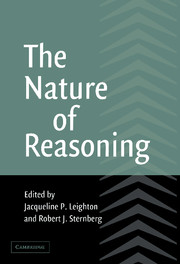Book contents
8 - Mental-Logic Theory
What It Proposes, and Reasons to Take This Proposal Seriously
Published online by Cambridge University Press: 05 July 2011
Summary
This chapter begins by addressing why one should expect a mental logic: In order to represent propositional information in declarative memory, the mind needs some logical predicate/argument structure. The chapter then turns to a vigorous debate that has taken place in the cognitive-psychology literature concerning whether there is a mental logic and addresses the principal argument against the idea made by some prominent cognitive researchers: Participants in laboratory experiments often make judgments that are at odds with a standard logic of the sort found in a typical logic text book. I argue that we have no reason to expect that mental logic should correspond consistently to logic as developed by professional logicians and, therefore, findings that judgments sometimes differ from standard logic need not be interpreted as evidence against a mental logic. The chapter then describes the mental-logic theory developed by Braine and O'Brien and evidence that supports it (see Braine & O'Brien, 1998, for the most detailed description of the theory and evidence for it). The theory has predicted, successfully, which logical-reasoning judgments people make easily and which they find difficult, which inferences are made effortlessly during text comprehension, and which judgments differ from what should be expected if people were using standard logic instead of mental logic. Finally, the chapter addresses whether an adequate account can be given of human reasoning processes without the inclusion of a mental logic, and argues that an adequate account of human reasoning requires inclusion of a mental logic.
- Type
- Chapter
- Information
- The Nature of Reasoning , pp. 205 - 233Publisher: Cambridge University PressPrint publication year: 2003



